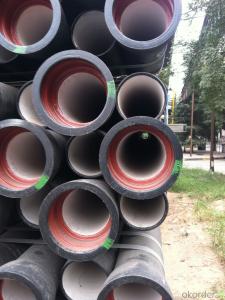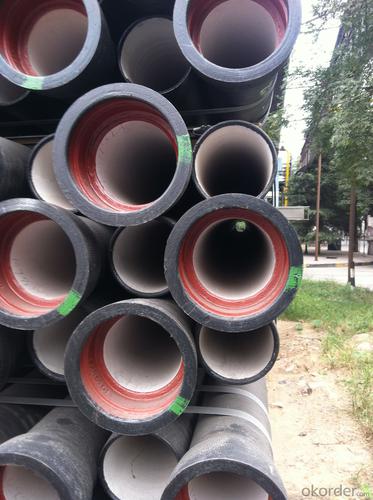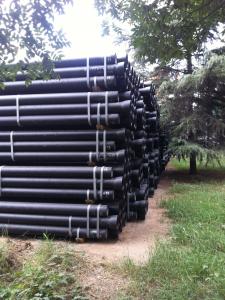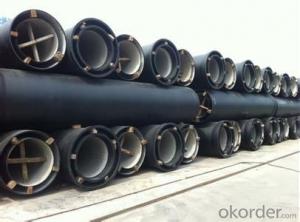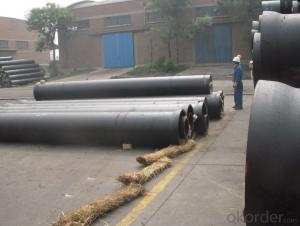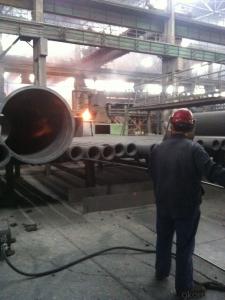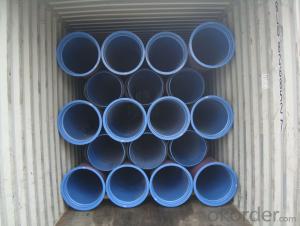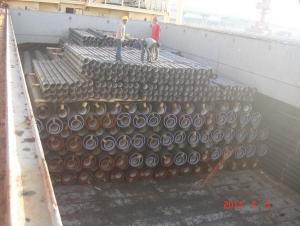DUCTILE IRON PIPE AND PIPE FITTINGS K8 CLASS DN80
- Loading Port:
- Tianjin
- Payment Terms:
- TT OR LC
- Min Order Qty:
- 23 pc
- Supply Capability:
- 3000 pc/month
OKorder Service Pledge
OKorder Financial Service
You Might Also Like
Material : Ductile Cast Iron
Size Range : DN 80mm to DN 2000mm
Unit Effective Length : 6m or 5.7m
Manufacture Standard: ISO 2531:1998/ EN 545:2006/EN 598:2007
Annual capacity : 200,000 tons
Coating Exterior: Zinc 130g/m2 according to ISO 8179-1 and bitumen coating 70 microns.
Cement Interior: Portland Cement/ High Alumina Cement/ Sulphate Resisting Cement Lining according to ISO 4179
Special requirements on external coating and internal lining can be applied
We also provide accessories such as SBR/EPDM rubber gaskets, lubricant paste, pipe caps, PE sleeves, etc.
Additional Parts:
Each pipe is strictly inspected according to related standard to ensure permanently high performance.
Easy Installation at site and service free for life
Long Service Lifespan
Quotation will arrive you within 24hours once we get your inquiry.
We guarantee offering you a competitive price.
A copy of original inspection reports of pipes will be offered after shipment.
Photos of loading process will be sent to the customer after shipment effect.
We will follow-up the delivery progress after shipment effect and update to the customer on weekly basis.
- Q: Do ductile iron pipes require internal lining for potable water applications?
- Yes, ductile iron pipes do require internal lining for potable water applications. This is because the iron used in these pipes can react with the water and potentially contaminate it. Internal lining acts as a barrier between the water and the iron, preventing any chemical reactions and ensuring the water remains safe for consumption.
- Q: Can ductile iron pipes be used in high-temperature applications?
- Ductile iron pipes are capable of being utilized in applications that involve high temperatures. Unlike PVC or HDPE pipes, ductile iron pipes possess a higher melting point, rendering them suitable for transporting fluids at elevated temperatures. The material properties of ductile iron, encompassing its strength, toughness, and ability to withstand thermal stress, allow it to endure higher temperatures without distorting or failing. Nevertheless, it is worth noting that the precise temperature threshold for ductile iron pipes may vary depending on factors such as the grade of ductile iron employed, the pressure of the fluid being conveyed, and the duration of exposure to elevated temperatures. Consequently, it is imperative to consult the manufacturer's specifications and guidelines in order to ensure the appropriate selection and installation of ductile iron pipes for high-temperature applications.
- Q: What are the advantages of using ductile iron pipe over concrete pipe?
- There are several advantages of using ductile iron pipe over concrete pipe. Firstly, ductile iron pipe has a higher strength-to-weight ratio compared to concrete pipe. This means that it can withstand higher pressure and loads while being lighter in weight. This makes it easier to handle and install, reducing labor costs and time. Secondly, ductile iron pipe has superior corrosion resistance compared to concrete pipe. It is less likely to rust or degrade over time, which increases its lifespan and decreases the need for frequent repairs or replacements. This makes it a more cost-effective option in the long run. Additionally, ductile iron pipe has better flexibility and resilience compared to concrete pipe. It can withstand ground movement, settling, and other environmental factors without cracking or breaking. This makes it more durable and less prone to damage, reducing maintenance and repair costs. Moreover, ductile iron pipe has a smoother interior surface compared to concrete pipe. This results in improved flow characteristics and reduced friction, allowing for more efficient transportation of fluids. It also minimizes the risk of clogs or blockages, ensuring uninterrupted flow. Furthermore, ductile iron pipe is highly versatile and can be used in a wide range of applications. It is suitable for both above-ground and underground installations, making it ideal for various infrastructure projects such as water supply systems, wastewater treatment plants, and industrial applications. Overall, the advantages of using ductile iron pipe over concrete pipe include its higher strength-to-weight ratio, superior corrosion resistance, better flexibility and resilience, smoother interior surface, and versatility. These benefits make it a reliable and cost-effective choice for various infrastructure projects.
- Q: What is the difference between ductile iron pipes and cast iron pipes?
- Ductile iron pipes and cast iron pipes are both commonly used in various applications, but they differ in their composition, properties, and manufacturing processes. Composition: Ductile iron pipes are made from a type of cast iron known as ductile iron, which contains higher levels of carbon, silicon, and other alloying elements like magnesium. On the other hand, cast iron pipes are made from regular cast iron, which has a higher carbon content and lower levels of alloying elements. Properties: Ductile iron pipes are known for their high tensile strength, flexibility, and durability. They can withstand higher pressure and have a greater resistance to impact, making them suitable for applications that require robust performance. In contrast, cast iron pipes are more brittle and fragile, which makes them prone to cracking or breaking under pressure or impact. Manufacturing process: Ductile iron pipes are created through a process called centrifugal casting, where molten ductile iron is poured into a spinning mold. This centrifugal force helps in distributing the molten metal evenly, resulting in a strong and uniform pipe. Cast iron pipes, on the other hand, are made using a process called sand casting, where molten cast iron is poured into a mold made of compacted sand. This method is less precise and can lead to variations in the final product. Applications: Due to their superior strength and flexibility, ductile iron pipes are commonly used in water and sewage systems, as well as in industrial pipelines that require high-pressure resistance. Cast iron pipes, on the other hand, are typically used in non-pressure applications like drainage systems or underground sewer lines. In summary, the main difference between ductile iron pipes and cast iron pipes lies in their composition, properties, manufacturing processes, and applications. Ductile iron pipes offer greater strength, flexibility, and durability, making them suitable for high-pressure applications, while cast iron pipes are more brittle and commonly used in non-pressure applications.
- Q: Can ductile iron pipes be used in acidic environments?
- Yes, ductile iron pipes can be used in acidic environments. Ductile iron has excellent resistance to corrosion, including acidic conditions, due to its protective oxide layer. This makes it a suitable choice for applications in which exposure to acids is expected.
- Q: What are the disadvantages of using ductile iron pipes?
- Using ductile iron pipes in various applications comes with several drawbacks. Firstly, these pipes tend to be more expensive compared to other types like PVC or HDPE, which can be problematic for projects with budget constraints. Secondly, their relatively heavy weight makes transportation and installation more labor-intensive and time-consuming. This increases overall project costs, especially when specialized equipment and skilled workers are required. Another disadvantage is their susceptibility to corrosion. Exposure to environmental factors, like soil conditions and water chemistry, can lead to rust and scale formation on the inner and outer surfaces of the pipe. This reduces the pipe's lifespan and potentially affects water quality. Furthermore, ductile iron pipes can crack or break under certain conditions, especially when subjected to heavy loads or significant ground movement. This necessitates costly repairs or replacements, causing additional expenses and disruptions to the water supply. Lastly, ductile iron pipes have relatively low resistance to impact and abrasion compared to other materials. This makes them more vulnerable to damage from external forces, such as construction activities or accidental impacts, resulting in increased maintenance and repair costs. In conclusion, while ductile iron pipes have advantages like high tensile strength and durability, it is crucial to consider these disadvantages before deciding to use them in a specific project.
- Q: Ductile iron pipe is how many years warranty
- In the ferrite and pearlite matrix on the distribution of a certain number of spheroidal graphite, according to the nominal diameter and the elongation of different microstructure of ferrite and pearlite in different proportions of small caliber pearlite percentage is generally not more than 20%, large diameter of the general control in about 25%.
- Q: Do ductile iron pipes require external coatings or wraps?
- Ductile iron pipes typically require external coatings or wraps to protect against corrosion. Despite being strong and durable, ductile iron is still prone to corrosion when exposed to specific environmental conditions. Applying external coatings or wraps adds an extra layer of protection, extending the lifespan and maintaining the structural integrity of the pipes. These coatings can vary and may consist of materials like epoxy, polyethylene, or zinc, acting as a barrier between the pipe surface and corrosive elements in the environment. Additionally, wraps made of materials such as polyethylene or polypropylene can provide mechanical protection against impact or abrasion. Therefore, it is generally advisable to apply external coatings or wraps to ductile iron pipes to enhance corrosion resistance and ensure long-term performance.
- Q: How does ductile iron pipe compare to PVC pipe in terms of strength?
- Generally, ductile iron pipe is considered stronger than PVC pipe due to its composition of iron and carbon, which provides it with high tensile strength and resistance to breakage. It is commonly utilized in heavy-duty applications like water mains, sewer lines, and industrial piping due to its ability to withstand high pressures. On the flip side, PVC pipe is manufactured using a plastic material known as polyvinyl chloride. While PVC pipe is lightweight and easy to handle, it lacks the strength of ductile iron pipe. It is typically used in low-pressure applications such as household plumbing, irrigation systems, and drainage pipes. When comparing the strength of ductile iron pipe to PVC pipe, the former has a greater capacity to handle heavy loads, endure ground movement, and resist damage from external factors like rocks or tree roots. Additionally, ductile iron pipe is more durable and has a longer lifespan in comparison to PVC pipe. However, it is important to consider that the choice between ductile iron pipe and PVC pipe ultimately depends on the specific requirements of the project. Factors such as cost, environmental conditions, ease of installation, and desired longevity should all be taken into account when determining the appropriate type of pipe to utilize.
- Q: How much is the installation cost of the ductile iron tube?
- Water supply pipe is the first choice, with high cost performance. Compared with the PE pipe, from the installation time, ductile pipe PE pipe installation is simple and rapid, and after the installation of internal and external pressure bearing better tightness and corrosion resistance; from the point of view, ductile pipe sealing better after installation, but also can improve the corrosion resistance through various anti-corrosion methods;
Send your message to us
DUCTILE IRON PIPE AND PIPE FITTINGS K8 CLASS DN80
- Loading Port:
- Tianjin
- Payment Terms:
- TT OR LC
- Min Order Qty:
- 23 pc
- Supply Capability:
- 3000 pc/month
OKorder Service Pledge
OKorder Financial Service
Similar products
Hot products
Hot Searches
Related keywords
